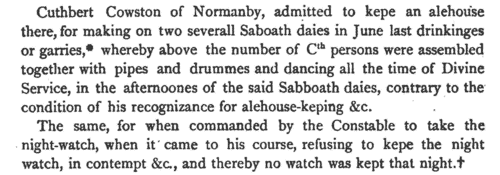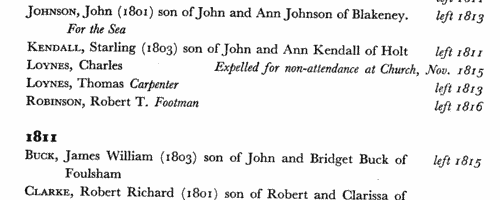Bartell Surname Ancestry ResultsOur indexes 1000-1999 include entries for the spelling 'bartell'. In the period you have requested, we have the following 25 records (displaying 1 to 10): Single Surname Subscription | | | Buying all 25 results of this search individually would cost £146.00. But you can have free access to all 25 records for a year, to view, to save and print, for £100. Save £46.00. More... |
These sample scans are from the original record. You will get scans of the full pages or articles where the surname you searched for has been found. Your web browser may prevent the sample windows from opening; in this case please change your browser settings to allow pop-up windows from this site. Traders in Canterbury
(1392-1592)
No man or woman could trade in the city of Canterbury without having obtained 'freedom' of the city, unless they paid an annual fee to do so. Admissions of freemen were recorded on the Chamberlains' Accounts of the city, which were prepared annually from Lady Day (25 March) to Lady Day until 1752, and thereafter each set runs from 1 January to 31 December. The accounts for 1392 are incomplete, but thereafter until 1800 there is a complete series except for the years 1455 to 1457 and the year 1552-3. Joseph Meadows Cowper, Honorary Librarian to the Corporation, transcribed and privately printed in 1904 the lists of the Intrantes - those persons, not being free of the city, who paid the annual fine to trade - for the period 1392 to 1592. The names are arranged by ward (Burgate, Newyngate, Westgate, Worgate and Northgate, and give full name, (sometimes) occupation, and fee paid. BARTELL. Cost: £4.00.  | Sample scan, click to enlarge

| Middlesex Sessions
(1549-1603)
This printed calendar collates a number of surviving records from Middlesex sessions for the period. Principally these are the Gaol Delivery Rolls (G. D. R.) and the General Sessions of the Peace Rolls (G. S. O. P. R.). Both series cover general criminal indictments (bills) together with the recognizances of the witnesses to attend; but the Gaol Delivery Rolls, by their very nature, tend to deal with the more serious cases - felonies where the accused could not be released on bail. The General Sessions rolls also include the sheriff's lists of bailiffs, sub-bailiffs, high and petty constables in the shire; writs of venire facias for production of jurors, writs of capias, lists of jurors, jury-panels &c. The Gaol Delivery Rolls also include coroners' inquests, writs of supersedeas, and memoranda of proclamations. Special inquiries are recorded in separate Sessions of Oyer and Terminer (S. O. T.) rolls and Inquest or Inquisition rolls (I. R.) Although coverage is good, none of the sequences of rolls for this period is complete. A peculiarity of this calendar is that in the case of actual incidents, the date given at the start of each entry is the date that the incident was alleged to have taken place (for instance, 1 June 11 Elizabeth (1569) in the sample scan) rather than the date of the court proceedings. BARTELL. Cost: £4.00.  | Sample scan, click to enlarge

| Quarter Sessions for the North Riding of Yorkshire
(1605-1612)
The Quarter Sessions minute books for the North Riding from April 1605 to July 1612 were edited by the Rev. J. C. Atkinson for the North Riding Record Society and published in 1884. This is a calendar of sessional orders, minutes of criminal cases, memoranda and other entries of record concerning the administration of the riding, for the quarter sessions and special sessions held at Thirsk, Stokesley, Richmond, Malton, Helmsley, Northallerton and Topcliffe. Recusants (persons refusing or neglecting to attend parish church services) are listed in the summary of prosecutions on pages 4-5, 10, 17, 21, 42, 55-56, 61, 65, 69, 72, 79, 82, 95, 99, 113-115, 122, 131, 153-155 and 176. BARTELL. Cost: £4.00.  | Sample scan, click to enlarge

| Testators and legatees in London
(1358-1688)
The Court of Husting of the city of London sat (usually on a Monday) each week: among its functions was the enrolment of deeds and wills relating to citizens of London. In their strictest technical sense the terms 'will' and 'devise' are appropriate to real estate, and the terms 'testament', 'bequest' and 'legacy' to personal estate, but this distinction is lost sight of in ordinary usage. This calendar of wills proved and enrolled in the Court of Husting was edited by Reginald R. Sharpe, records clerk in the office of the Town Clerk of the City of London, and printed by order of the corporation in 1890. The date of the court is given in italics, with the year in bold in the margin. The testator's name is given in capitals (surname first, in bold), and then a brief listing of substantial bequests, with the names of legatees, and then the date of making of the will, and reference. The bulk of the wills in this volume are from before 1600. BARTELL. Cost: £4.00.  | Sample scan, click to enlarge

|  Masters of Apprentices registered at Norwich in Norfolk
(1715-1717) Masters of Apprentices registered at Norwich in Norfolk
(1715-1717)
Apprenticeship indentures and clerks' articles were subject to a 6d or 12d per pound stamp duty: the registers of the payments usually give the master's trade, address, and occupation, and the apprentice's father's name and address, as well as details of the date and length of the apprenticeship. There are central registers for collections of the stamp duty in London, as well as returns from collectors in the provinces. These collectors generally received duty just from their own county, but sometimes from further afield. Because of the delay before some collectors made their returns, this register includes indentures and articles from as early as 1714. (The sample entry shown on this scan is taken from a Norfolk return)BARTELL. Cost: £8.00.  | Sample scan, click to enlarge

|  Apprentices registered at Norwich in Norfolk
(1750-1754) Apprentices registered at Norwich in Norfolk
(1750-1754)
Apprenticeship indentures and clerks' articles were subject to a 6d or 12d per pound stamp duty: the registers of the payments usually give the master's trade, address, and occupation, and the apprentice's father's name and address, as well as details of the date and length of the apprenticeship. There are central registers for collections of the stamp duty in London, as well as returns from collectors in the provinces. These collectors generally received duty just from their own county, but sometimes from further afield. (The sample entry shown on this scan is taken from a Norfolk return)BARTELL. Cost: £8.00.  | Sample scan, click to enlarge

|  Apprentices registered in Norwich
(1755) Apprentices registered in Norwich
(1755)
Apprenticeship indentures and clerks' articles were subject to a 6d or 12d per pound stamp duty: the registers of the payments usually give the master's trade, address, and occupation, and the apprentice's name, as well as details of the date and length of the apprenticeship. There are central registers for collections of the stamp duty in London, as well as returns from collectors in the provinces. These collectors generally received duty just from their own county, but sometimes from further afield. The indentures themselves can date from a year or two earlier than this return. (The sample entry shown on this scan is taken from a Liverpool return. Each entry has two scans, the other being the facing page with the details of the indenture, length of service, and payment of duty.) IR 1/52BARTELL. Cost: £8.00.  | Sample scan, click to enlarge

|  Masters of apprentices registered in Norfolk
(1776) Masters of apprentices registered in Norfolk
(1776)
Apprenticeship indentures and clerks' articles were subject to a 6d or 12d per pound stamp duty: the registers of the payments usually give the master's trade, address, and occupation, and the apprentice's name, as well as details of the date and length of the apprenticeship. There are central registers for collections of the stamp duty in London, as well as returns from collectors in the provinces. These collectors generally received duty just from their own county, but sometimes from further afield. The indentures themselves can date from a year or two earlier than this return. (The sample entry shown on this scan is taken from a Bristol return. Each entry has two scans, the other being the facing page with the details of the indenture, length of service, and payment of duty.) IR 1/59BARTELL. Cost: £8.00.  | Sample scan, click to enlarge

| Boys entering Gresham's School
(1777)
The Sir John Gresham Grammar School at Holt in Norfolk was founded by sir John, who bought the manor house there in 1546 to convert it into a school, and building work had started by 1555. To celebrate the quatercentenary in 1955, a history of the school written by the Reverend C. L. S. Linnell was published, together with an Alumni Greshamienses, a register of boys entering the school from 1562 to 1954, compiled by A. B. Douglas. The materials to hand for the register for the early years were slight; the first coherent lists of boys survive only from 1729, and then are fitful, with little detail, and largely missing from 1784 to 1803; however, from 1810 onwards the names of boys' parents are usually recorded. The register is arranged chronologically by year (and from 1900 by term - L, Lent; M, Michaelmas; S, Summer), and then alphabetically by surname (in capitals) and christian name(s). Where known, year of birth is then given (in brackets), names, addresses and occupations of parents. From 1900 onwards there are italic abbreviations for sporting achievements at school (h, hockey colours; VIII, shooting colours; S, first-class swimmer; XI, cricket colours; XV, football colours), and p for house prefect and P for school prefect; then (in italics) information about the boy's adult life, and his address (where living) at the time of publication. Finally, on the right hand side of the page, in italics, is given the year of his leaving the school. Most detail is absent before 1810; and, of course, for the boys still at school in 1955, or only recently left, there are no details of future career; nor are there the usual details about their parentage. From 1898 onwards day boys are noted with an italic D (N means Newquay dayboy); and from 1900 onwards the school houses are shown (B, Bengal Lodge; F, Farfield; H, School House or Howson's; K, Kenwyn; O, Old School House; W, Woodlands); and, for the junior school, c, Crossways; k, Kenwyn; o, Old School House).BARTELL. Cost: £4.00.  | Sample scan, click to enlarge

|  Apprentices registered in Norwich
(1796) Apprentices registered in Norwich
(1796)
Apprenticeship indentures and clerks' articles were subject to a 6d or 12d per pound stamp duty: the registers of the payments usually give the master's trade, address, and occupation, and the apprentice's name, as well as details of the date and length of the apprenticeship. There are central registers for collections of the stamp duty in London, as well as returns from collectors in the provinces. These collectors generally received duty just from their own county, but sometimes from further afield. The indentures themselves can date from a year or two earlier than this return. (The sample entry shown on this scan is taken from a Bristol return. Each entry has two scans, the other being the facing page with the details of the indenture, length of service, and payment of duty.) IR 1/68BARTELL. Cost: £8.00.  | Sample scan, click to enlarge

|
Research your ancestry, family history, genealogy and one-name study by direct access to original records and archives indexed by surname.
|













